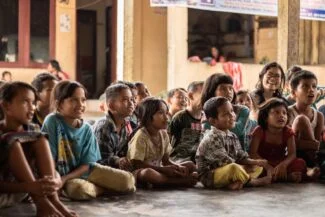~Sangyukta Das
Education has become one of the most necessary tools that enables a person to become a responsible and suitable citizen of tomorrow. With numerous changes in the education policy of India and the NEP 2020 policy being introduced in July 2020, we can see the rising importance of education for each and every individual. The schools, colleges and educational institutions in India largely cater to the ‘Right to Education’ that is guaranteed for every child. However, despite the education that is imparted in these institutions, quite a lot of children, even though they attend school and qualify their classes, sometimes lack real knowledge and don’t know the basics of languages or calculations. Keeping such lapses in mind and to fill up this gap in imparting education and the fallacy in the right to education act, SK Children’s Foundation has introduced level-based teaching. Level-based education helps to fill up the learning gaps among school-going children and helps them to attain cognitive and non-cognitive skills that differ from the prescribed syllabi in schools.
Quality of Education
Level-based education is a kind of non-formal education that is imparted on the basis of how much a child can understand and develop his basic skills of languages and numbers while also continuing with formal education in their enrolled schools. This kind of education goes beyond the policies of recruiting well-educated teachers, providing proper books, increasing the admissions, and building massive infrastructure that is usually brought into focus in formal education where it is assumed that these inputs will easily generate a good output.
This helps to overcome the barriers of the academic coursework prescribed in the syllabus of the schools which easily assumes the notion of one-size-fits-all. It is a boon for those children who fail to follow up with the school work and exams but still qualify for the classes because of the policy of right to education until 14 years of age. It has been observed that even though these children may easily pass out their matriculation from a government school, however, they are still unable to practically perform up to the levels required as a tenth pass student.
SK Children’s Foundation- A New Spectra of Educational Organisation
In SK Children’s Foundation, this form of education was initiated keeping in mind the children who come from underprivileged rims of the society and only manage to afford to go to government schools. Here, children are admitted through a level-based test that tests their capability in terms of general, logical, and a few situations based questions. The test is usually attached to the admissions form. Once they are admitted, they are divided into five levels wherein the levels resemble their level of learning in that particular arena. Following that, teachers are assigned and classes are conducted usually with a group of four-five students over a video call on Whatsapp. The teachers help them with their homework, practice questions, and work on the basic skills using a range of convincing techniques which makes the session fun and interesting. The teachers have a 15-day plan after which exams are conducted virtually and the students are graded. This has yielded a lot of positive results and good feedback from the parents as well as other NGOs.
According to studies by the UNICEF Education Strategy, around 420 million children will fail to attain basic skills in childhood, and nearly double, that is, 825 million will fail to attain basic secondary skills by 2030. In a study conducted by the United Nations during the COVID pandemic, around 387 million primary school-age children worldwide were estimated to lack basic reading skills.
The Bottom Line
In my opinion, this type of level-based education can help to increase the efficiency of the children and garner the full potential of the immense human resource that is in the treasure trove of India. An education based on developing cognitive skills and basic skills is the ultimate need of the hour. It is only with such initiatives that are taken up by NGOs like SKCF can we drive a real change in the education sector of the country and propel India to a brighter future ahead.
Must Read: Gurukul and Montessori System



2 responses
There is any job for teacher or education related
Hi, Bhavika. Thank you very much for going through our blogs. It’s a pleasure to give voice to the facts and opinions for you all to read. Keep encouraging us by staying tuned to our posts and with your lovely comments.
Work with us You can surf on this page for career related query.
Thanks a lot!